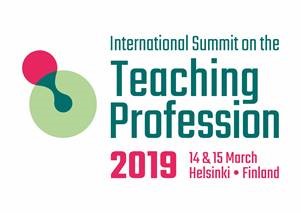Ministers of Education and teaching organisation leaders from countries with top education systems attending summit in Finland

As the first ever Nordic country, Finland will host the International Summit on the Teaching Profession (ISTP) on 14 and 15 March 2019. ISTP brings together countries with the best performing or rapidly improving education systems as measured by the Programme for International Student Assessment (PISA).
Advance information suggests some 20 Ministers of Education and leaders of teachers’ organisations have accepted the invitation to meet up in Finland. During the Summit, they will visit schools and nurseries to find out about Finnish early childhood education and care, and comprehensive education.
“The best in the world are coming to see us. What a great opportunity for us to demonstrate Finnish education expertise and share best practices,” said the Finnish Minister of Education Sanni Grahn-Laasonen.
At Finland’s initiative, the Summit agenda will include early childhood education and care (ECEC) as a new theme. Globally, as the importance of early years is being more widely recognised, many international agencies are bringing ECEC into focus as part of their objectives. More studies are showing how significant the early years are for a child’s life. During their first five years, children rapidly acquire linguistic, cognitive, social and emotional skills, while their knowledge and other capacities increase.
“The preventive impact of ECEC is now better understood in many countries, and ECEC is increasingly seen as an investment in our future. High standards of ECEC prevent exclusion and help children, particularly those from a disadvantaged background,” said Minister Grahn-Laasonen.
“I agree on the importance of early childhood education and care, and I am very pleased that, at Finland’s initiative, the Summit will discuss both ECEC and vocational education and training for the first time,” said Olli Luukkainen, President of the Trade Union of Education in Finland (OAJ).
A key difference between countries concerns the attitudes to children’s learning outcomes and how they are determined, achieved and assessed. Children start school at different ages, ranging from 3 to 4 years to 7 years of age. With the other Nordic countries, Finland promotes the idea that children should not be given ECEC learning targets for knowledge and skills. Instead, targets should be set for progress in the children’s learning capacity, standard of staff activities and the setting.
In the 2010s, all Finnish ECEC was moved from the social services provision to the remit of education policy. Additionally, obligatory pre-primary education and curricula have reinforced the continuum from ECEC to comprehensive education.
“In Finland, one of the strengths of ECEC – and comprehensive school – is the understanding of the power of play in learning. Instead of early school starting age, we value childhood, play, stories and basic skills,” said Minister Grahn-Laasonen.
---
The International Summit on the Teaching Profession (ISTP) is organised once a year jointly by the Organisation for Economic Co-operation and Development (OECD), the global federation of education employee unions Education International, and the selected host country. Previous hosts include Germany, Canada, Portugal, New Zealand and the United States. From the beginning, the Summit’s method has been to accept official delegations only if they include both the Minister or Deputy Minister of Education and the leader or deputy leader of a teacher organisation. OAJ’s President Luukkainen thinks this is an excellent method, as it puts an emphasis on working together to reinforce the equality of education standards. The countries invited to the Summit have changed over the years. Finland, however, has received an invitation to every Summit.
This year, the Ministers or Deputy Ministers of Education and leaders or deputy leaders of teachers’ organisations who have accepted the invitation come from at least these countries: Belgium, Czech Republic, Estonia, Georgia, Hong Kong, Ireland, Latvia, Moldova, Portugal, Poland, Russia, Singapore, Slovenia, South Korea, Spain, Sweden, Switzerland, United Kingdom, including Scotland, and Vietnam.
In addition to ECEC, the ISTP themes include shared and inclusive leadership and the sustainability challenges facing education.
Inquiries:
- Mäki-Lohiluoma, Special Adviser, tel. 0295160812
- ISTP: Kati Anttalainen, coordinator, tel. 0295330061
- Media events: Katarina Koch, Communications Specialist, tel. 0295330157
- Teacher organisations: Anders Rusk, international coordinator, OAJ, tel. 0405083268
- www.istp2019.fi

